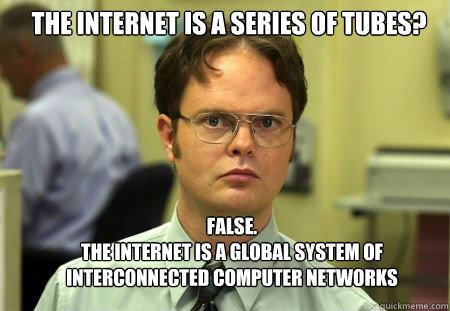How the Internet *really* works: The Monday Round-Up
Small Photo
Photo

In addition to forming the very organization that in turn produced a cool democracy-supporting non-profit (read: us), President Ronald Reagan declared June 25 as National Catfish Day in the United States. After reading this week's news round-up, celebrate with a nice piece of fresh fish.
Events:
- CIMA is hosting a panel tomorrow on Internet governance in anticipation of the UN's 7th annual Internet Governance Forum in November. Panelists will discuss the ITU's Internet governance proposals, press freedom, and the changing Internet environment.
- Rosemarie Garland-Thomson talks about expanding the concept of accessible technology at The Berkman Center in Cambridge, MA tomorrow. The event will be webcast.
News:
- EDRi publishes a guide to How the Internet Works for policy-makers and other non-techies that have trouble understanding encryption and HTTPS (like your CEO).
- John Watts of The Guardian reflects on the decade he spent in China, and witnessing the birth of a superpower.
- The FBI releases their Social Networking Risks Report, and stresses that "humans are a weak link in cyber security." On the other side of the globe, The Borneo Post warns that cyber security threats via social media will only increase as Internet access grows.
- Were you affected by the Twitter crash late last week? Some say it was because of the Farm bill, a hacker group called Cosmo claims credit, but the Twitter blog says it was just a bug.
- Fearing extradition after the UK Supreme Court refused to reopen his case, Julian Assange of WikiLeaks is seeking political asylum in Ecuador. Robert Cringley of InfoWorld offers a snarky six reasons why Ecuador should grant his request.
- Similar to Stuxnet, the Flame virus was created by a coalition of the NSA, CIA, and Israel's military as a cyberattack against Iran's nuclear program.
- Remember talking about electronic backdoors in US telecoms equipment a few weeks ago? A China tech company brags they've exploited these backdoors and gained access to "malicious" data.
- The Global Security Map shows global hotspots for cybercrime according to geographic location. Read the interview with one of the creators.
- Fund for Peace releases the 2012 Failed States Index, with Somalia at #1 for the 5th consecutive year.
- Apparently Facebook thinks we all want an @facebook.com email address. Since this is not the case for most people, check out lifehacker's quick steps to getting your old email address back on your profile.
- Remember Where the Hell Is Matt? Ethan Zuckerman talks about dancing around (and with) the world, and shows off Matt's new video.
- In honor of Alan Turing, check out this awesome Turing machine made of LEGO.
Topics
